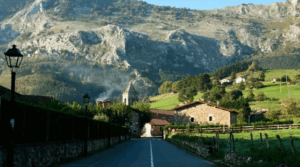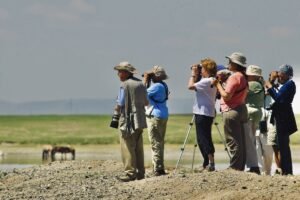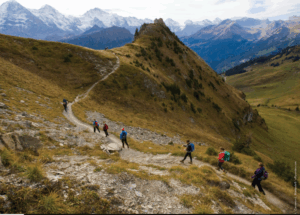Women Guides in the mountains
Anna S. Sussman
On the cold, rocky trails of the world’s 10th tallest mountain, porters carry wicker baskets packed with ice axes and climbing ropes.
They are headed to Annapurna base camp, a mountain expedition outpost deep in the Himalayas of Nepal. Among the lines of wheezing tourist trekkers and docile pack mules slowly ascending the trails, Januka Rai, in her twenties, skips lightly up the mountain, ignoring the stares of the weathered porters she passes. A female trekking guide is a not very common sight at 10,000 feet.
Small minority
Women in the guiding ranks remain a small minority in the massive Himalayan trekking industry, where the legacy of Sir Edmund Hillary and Tenzing Norgay, the world’s first mountaineers to summit Mt. Everest in 1953, looms large. In 2008, trekking accounted for eight per cent of Nepal’s gross domestic product and was the third-largest revenue generator after agriculture and industry.
But, in recent years, female trekking guides and porters have been gaining ground among the more moderate tourist treks thanks to three sisters: Nicky, Dicky and Lucky Chetri. The Chetri women, natives of Darjeeling, India, opened a restaurant 14 years ago in Pokhara, Nepal, in the foothills of the Annapurna mountain range, and catered to trekkers returning from long hikes.
“Women would come into the restaurant and tell us terrible stories from the mountain, about harassment from their male trekking guides,” says Dicky Chetri, 43, the middle of the three sisters. She wears the enthusiastic smile of a teenager and a long, thick braid held back from her face with a pair of sunglasses.
Before long, she and her sisters recognised an unmet business demand. “So many women came back with bad experiences, they would be alone on the mountain with these men and they were very vulnerable. We knew what we needed to do,” she says.
But with no mountaineering experience of their own, the sisters were truly starting from the ground up. In a terrifying leap of faith, Chetri says, she and her sisters – whose unmarried status has been a matter of local media attention here – closed their restaurant and gathered all the women they could for a crash course in mountaineering.
“We went door-to-door looking for women. We told them just to give it a try, but their families resisted; they were very afraid. We could only convince 10 women.”
In the dining room of their restaurant, they learned about first aid, avalanche warnings, acute mountain sickness, tourism, trekking and women’s empowerment. “We were laughed at by almost everyone. We had no idea if we were even doing the right thing by closing the restaurant,” says Chetri.
The challenges ranged from a taboo on women wearing trousers, to a deeply entrenched resistance toward wives earning money, from doubts about women’s strength and mental acuity to a cultural belief that women are bad luck on the mountain. Few women in Nepal have jobs outside of agriculture, harvesting rice and wheat, earning about $3 a day, says Chetri.
Today, the Three Sisters trekking agency trains about 50 women a year and leads hundreds of foreign trekkers – independent tourists from Europe, the United States, Japan and India – over the Annapurna mountain range. In fact, depending upon the level of difficulty and time available they have specially-designed treks – there’s the Tea House Treks to Jomsom, Annapurna Sanctuary, Annapurna Circuit and Everest, among others; Rural Treks to Panchase and Nangi village; Camping Treks to Panch Pokhari, Mardi Himal, Sikles and Upper Mustang.
Mostly their clients are large women-only groups and they are comfortable with the sisters’ trained guides who generally are single college students or poor farmers’ wives. The Three Sisters, that also runs a lodge and the reopened restaurant in Pokhara, operate an onsite child-care centre for guides working on the mountain. The training business has also spawned the local Women’s Empowerment Network aimed at low-income rural women.
“The majority of Nepalese women are entirely dependent on their husbands for everything,” says Chetri. “That means they cannot leave abusive households; most cannot read or write and have no choice but to live at the mercy of their husbands.”
To escape abusive households, some women sneak out in the night to attend Three Sisters trainings, informs Chetri. Others come for training over family objections that, according to Chetri, melt away when the lucrative pay cheque arrives. Guides earn up to $10 a day, an impressive salary in a country with a per-capita gross domestic product of $260. “Once they are trained, they can do whatever they like; they can support themselves and their children,” she adds.
It takes humility but many husbands come to accept that their wives now earn more than them. Property and inheritance rights for women are closely tied to marital status and almost half of all married Nepali women are wed before the age of 19. The country has one of the widest gender gaps in primary education in the world, with boys in secondary school outnumbering girls 2-to-1.
The empowerment programme starts with confidence-building and education, including workshops on women’s rights. “Many of the women have never even heard of rights. They don’t even know that it’s legal to live without a husband,” reveals Chetri.
But it’s the opportunity for work paying twice as much as the daily wages as those paid in the rice fields that allows women their real freedom, she says.
Most women hear of the programme via word of mouth in their villages and travel long distances to reach it. Some women shift the skills they learn in the trainings to unrelated fields, such as call centres or restaurants. But most work for the Three Sisters trekking agency, which has over 15 permanent guides and about 50 more on-call.
Work on the mountain still brings unique challenges for female guides. They typically work alone – not in pairs or teams – and often find themselves the only woman in crowded dining rooms, sleeping alongside male guides and porters, who are often drunk and occasionally resentful.
They are sometimes heckled and teased and know that they are expected to prove their physical and mental capabilities each day on the trail, as they are scrutinised by their male colleagues.
Pay cheque
The Three Sisters enforce a 12-kilogramme (about 26 pounds) weight limit for their porters, while male porters carry as much as 50 kilos.
Januka Rai, who comes from the eastern region of Nepal, funded her college tuition by working as a guide in the off-seasons. She recalls that every time she climbed the final stretch toward Annapurna Base Camp, she felt awed by the stunning landscape. But when asked about the best part of her work she didn’t hesitate in answering: “My pay cheque.” (By arrangement with Women’s eNews/ WFS )














